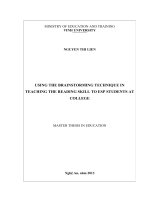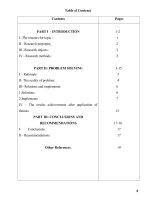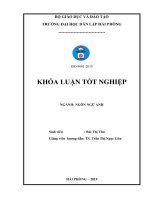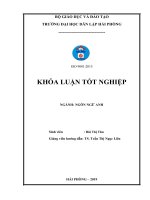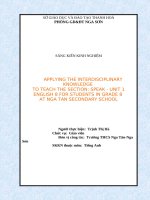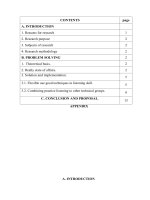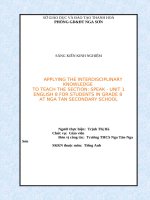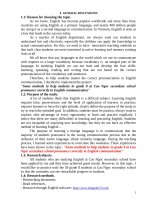Experience of teaching english reading skill effectively for students of grade 8 at thiet ke secondary school in one specific lesson
Bạn đang xem bản rút gọn của tài liệu. Xem và tải ngay bản đầy đủ của tài liệu tại đây (140.81 KB, 17 trang )
Table of Contents
Contents
Pages
I. INTRODUCTION
2
1. The reasons for topic :
2
2. Research purpopes:
3
3. Research objects:
3
4. Research methods:
3
II. THE CONTENT OF THE INNOVATIVE
3-15
EXPERIENCE
1. Rationale
3
2. The reality of problem:
4
3. Solutions and implements:
6
4.The results achievements after application of themes:
14
III. CONCLUSIONS AND RECOMMENDATIONS
- Conclusions.
- Recommendations.
15-16
15
16
Other References.
17
1
I. INTRODUCTION:
1. The reasons for topic:
The industrialization and modernization of the country has set new requirements
for social-economic development in the present time, requiring the demand of
qualified, dynamic, Positive, creative knowledge. Consequently, the education sector
plays an important role in the human development strategy. Prior to that important
role, the education sector has made changes in textbooks, teaching methods.
Renovation of educational methods is an urgent and fundamental requirement, a
revolutionary life in the whole industry in the current period to improve the quality of
teaching and learning. To meet the purpose of the content renewal - teaching methods
bring the most effective effect for secondary school students. The Ministry of
Education and Training has adapted textbooks more appropriately. In the Intensive
English Program, the topics are clearly designed to address four specific skills:
listening, speaking, reading and writing in each unit of studying.
As an English teacher, I realize that students must be trained to develop
holistically all four of these basic skills. On the other hand, in the process of teaching
English, reading is a very basic skill that is very important and essential in teaching
and learning foreign languages in general and English in particular. Reading is both a
goal and an effective and necessary means for students to master, strengthen their
linguistic knowledge, broaden their vocabulary, and deepen their understanding.
Therefore, in the teaching process, teachers require methods of communication
appropriate to each object, so students absorb better. For students in 8th grade at the
junior high school level, students can learn more about the need to improve the
English language by reading the paragraphs by topic. Students do not develop reading
comprehension skills, they are difficult to absorb and remember the information in a
sustainable and long-term. In the process of teaching English in secondary school, I
found that the reading comprehension ability of students in general was limited. In
order to overcome these difficulties, teachers should pay attention to the skills and
methods of teaching English reading comprehension to students, especially eighth
graders.
By teaching in Secondary School, I find that students learn reading skill not
effective, or through written tests (one or more quizzes), most students skip reading
or do weakly because the do not understand the main content of the texts.
In order to overcome the above situation and at the same time apply the objectives
of English language education. I have many doubts as how to teach the reading skill
effectively, I offer some experience to help students in grade 8 improve their reading
skill, so that students have better results in learning. And these are the reasons why I
boldly launched an initiative experience " Experience of teaching English reading
skill effectively for students of grade 8 at Thiet Ke secondary school in one
specific lesson."
2
2. Research purpopes:
- This subject is studied in the scope of teaching reading comprehension of English
lessons in grade 8 at my school.
- Focus on the study and use of teaching steps and techniques in English reading
comprehension lessons 8.
3. Research objects:
Initiative experience focused on teaching methods to improve the efficiency of
reading comprehension and improve the quality of English 8 at Thiet Ke secondary
school .
4. Research Methods:
1. Material Research Methodology:
+ Studying materials: reference books teacher, regular refresher, workshop materials
and related materials.
+ Observe the dispatches and directives of the Ministry, the Department, the
Education and Training Department, the plan of the school and the team.
2. Method of investigation and comparison:
By many different methods: attend colleagues, experiment, check the results of
student learning to find out the suitable teaching methods for students.
II. THE CONTENT OF THE INNOVATIVE EXPERIENCE
1. Rationale:
Since the second decree of the Central Committee and especially after the IX
Party Congress and the sixth decree of the Party Central Committee, the Congress,
the instruction No. 40 of the Secretariat of the Party Central Committee together with
the guiding documents of the House The Ministry of Education and Training and the
Vietnamese education system have achieved remarkable achievements in the fields of
education universalization and intellectual enhancement in human resource training
and talent fostering. In the general education program issued in conjunction of the
Minister of Education and Training also stated: "To promote positive, self-conscious
Students 'self-learning, cooperative ability, creative thinking and creativity, suitable
with setting subjects, characteristics of pupils, conditions of each class, practice the
skill of applying knowledge into practice, bringing joy, excitement and responsibility
to students. "
In the opinion of some experts, such as Colvin & Root (1981), Havernson &
Haynes (1982), Mc Gee (1977), Thornis (1980), etc. The English teacher should pay
attention to the influencing factors. The ability to focus on students, their ability to
read and understand, their ability to read alone and read to others, and so on. Can be
achieved during the training in reading activities. The result is fast or slow depending
on the student's prior knowledge of mother tongue, health, and visual acuity. There
are also other factors that affect students' reading skills such as unequal student
perceptions. Therefore, they need to be thoroughly instructed in reading the lessons,
so as to increase their interest in the topic of the lesson. Many students find it difficult
to read long texts and new words. Students generally have the habit of reading each
3
word in the lesson, not paying attention to the general reading of the lesson. While
limiting the attention to understanding the meaning of the lesson. The level of
comprehension of the lessons depends on the ability of the student.
So in order to teach an English lesson effectively, teachers need to pay attention to
a wide range of students so that they can provide a means to help students who are
weak, creative and active in their studies. Born quite good at how to read the lesson
becomes lively. Teachers need to combine spoken and written skills in reading
instruction so that students can express their ideas, opinions, and comments about the
text.
On the other hand, the 2016-2017 school year continues to improve management
and improve the quality of education, the school year continues to carry out three
campaigns to "study and follow Ho Chi Minh's moral example" According to the
Political Bureau's, the campaign "every teacher and teacher is a moral example, selflearning and creative" and the emulation movement "Building a friendly school,
students Positive "to improve quality. As a result, teachers across all disciplines are
empowering their students with the skills and knowledge they need to help them
develop intellectually and intellectually, to shape their child's personality, Socialists.
2. The reality of problem:
In order to meet the quality demands of the education sector and the actual
situation at school, most students do not have effective learning methods. Some
students are often distracted, less interested in their studies, some less likely to have
time to study at home because they have to support their parents, a large number of
disadvantaged students. Less reference books to raise capital beyond the textbook
supply. On the other hand, they have less communication requirements in English and
they are also afraid to communicate in English outside of school. Over the years
teaching the grades 8 and 9, I found that these are the two most widely distributed
listening, speaking, reading and writing skills. Each skill is much harder than grades 6
and 7. For reading skills are very clear in each lesson. They do not simply read a text
or a short, simple text with the request is as simple as filling in the words, they have
to read a long lecture or dialogue, then have to grasp. It is very likely that the content
of the entire reading to answer questions or choose the right and wrong sentences,
depending on the requirements of each article. That is, they must have a comparative
level of reading comprehension can meet this knowledge requirements.
However, through the teaching practice, I see clearly that most of them are very
weak. As a result, in the course of teaching English 8, I have learned some lessons to
help 8th graders improve their reading skills to help them master the basics and A
form of reading, from which children reinforce their learning and do better reading
exercises. From this point of view, I have decided to implement this topic to help
them improve some of the difficulties and obstacles that they have learned in this skill
and their desire to contribute a small part to their efforts. To gradually improve the
quality of English teaching in schools. Assigned to teaching English 8 for a total of 23
pupils, the educational level of the children is quite high between good students and
weak students. Therefore, weak students can not keep up with good students.
4
Reason:
+ Loss of basic knowledge in the lower layer, unspecified, sentence form.
+ Their vocabulary is limited.
+ They are afraid of difficulty, not preparation, not belong.
In order to innovate effective teaching methods, the following principles are
needed:
+ Excitement for students and clear explanation.
+ Respect for students and the learning of students, enabling students.
+ Regularly evaluates and responds to students.
+ Identify goals and intellectual challenges for students.
+ Identify students autonomy, seek independent paths to understand the lesson and
self-examination.
+ Teachers should always find out about the students giving appropriate instruction.
To teach the reader what is best and to use the most effective methods, the
teacher needs to rely on reading situations in the beginning, the teacher can give
suggestions, or some tips Small to help students are interested in the subject and
easily understand faster and more accurately.
Teachers need to keep abreast of their knowledge, skills, and goals, and decide
what kind of exercises to use for each stage of the unit. On the other hand, the
preparation of a variety of reading assignments Will prevent students from being
boring, monotonous during class. In addition, teachers must create excitement for the
good student and at the same time create a sense of confidence for the students to
learn weakly, giving students the opportunity to practice reading comprehension in
many different genres.
Finally, teachers need to inculcate the memory of students through hands-on
exercises and real-life interactions.
In the II semester of school year 2015-2016, I have conducted a survey of the
process of acquiring all secondary school students in grade 8, testing their knowledge
through lession14: Wonders of the World.
15-minute test: Read the passage carefully, then do True or False statements and
answer the questions:
Centuries ago in Ancient Greece, a man by the name of Sidon compiled a list of
what he thought were the seven wonders of the world. The seven included the
Hanging Gardens of Cheops in Egypt, The Pyramid is the only wonder you can still
see today. Many people claim that there were other wonders, which the Ancient
Greeks knew nothing about .These include the Great Wall of China, the Taj Mahal in
India and Angkor Wat in Cambodia.
A. True or False(4.0pts)
1. The seven wonders were built by Antipater of Sidon...
………….
2. He made the list many years ago.
………….
3. Of the seven wonders, you can only see the Pyramid today.
………….
5
4. Hanging Gardens of Babylon was in Iran.
………….
B.Answer the questions : (6.0 pts)
1.What is the only wonder you can still see today?
..................................................................................................................
2. What do many people claim?
...................................................................................................................
3.Is Angkor Wat in China?
...................................................................................................................
Results of the survey are as follows :
Grade Amount
Excellent
SL
%
Good
SL
Everage
%
SL
%
Weak
SL
%
Poor
SL
%
8
26
0
0
2
7.7
12
46.1 8 30.8
4 15.4
This result made me worried so much, so I confidently changed the methods and
techniques to improve the students’results.
3. Solutions and implements:
1. The solutions:
In the face of the above difficulties, as a teacher of the subject, I would like to
give some experience to guide students in the 8th grade to read a good reading.
+ Introduce short, concise readings.
+ Use pictures, visual tools to introduce new words, reading situations.
+ Make sure students understand the new grammatical structure.
+ Give some open-ended questions or predictions before reading. Provides the type of
exercises while-reading / post-reading.
+ Deepen students' memory through hands-on exercises and real-life contact.
2. Implements:
In the normal reading lesson, follow the Communication Approach and follow
The PPP Framework:
- Pre-reading.
- While-reading.
- Post-reading.
1. Warm up: Before implementing the three main steps in the reading assignment,
first ask the teacher to avoid harassing the student by chatting about some reading
related things or instructing them Simple and appropriate game play to direct students
into reading. Remember, try to give them a warm-up mentality. Some games can
perform such as: brainstorming, jumbled words, and so on.
Example 1. Warm up:
(English 8 - Unit 4. Lesson 4 :Read )
6
Brainstorming: ( May be in Vietnamese)
Tấm Cám
Cây tre trăm đốt
The folk tales of Vietnam
--
Sọ Dừa
Example 2: Warm up:
(English 8 - Unit 6. Lesson 4 :Read )
Jumbled words:
racchtaer
iojn
mai
pexailn
nessmsimbuan
thauolgh
character
join
aim
explain
businessman
although
2. Pre-reading activities: This is a very necessary activity for students. Lacking this
activity, students are no less difficult to do a comprehension task.
+ Introduction to the reading:
- This activity is important in providing students with reading information.
- The introduction should be concise, inspiring, and engaging. On the other hand, the
teacher needs to help students connect the reading with the knowledge they have
learned.
+ Methods to introduce a reading:
- Use visual tools: Teachers can use pictures to draw students' attention to the main
point of the reading to create a fun atmosphere for the students.
+ Teachers can use the following ways to introduce new words:
- Pictures, real things, mine.
- Synonym / antonymn.
- Translation.
- Explanation.
- Games: matching, Rub out and remember, What and Where, Slap the board, etc...
* Introduction of new grammatical structure:
- Teachers should review or introduce the grammatical structures included in the
reading.
* Student Oriented Activities in Reading:
- Teachers should provide an overview of the topic of reading and use of data related
to the student's life experiences through a number of activities such as: Asking openended questions and helping students predict total content. The verse of the reading.
7
Teachers should ask open-ended questions in the sequence of events in the reading or
in the sequence of reasoning. These questions represent the basic structure of the
reading and are a means to help students predict the content of the reading, so they
move on to reading the text more spontaneously.
* Illustrative Examples:
Example 1. Pre-reading (English 8 - Unit 4. Read)
Pre-teach vocabulary: - well-paying job: high income jobs. (Translation) Typhoon (n):
(storm) big storm. (Example) - flood (n): flood (Situation) - drought (n): drought.
(Antonym) - migrant (n): migrant. (Explanation) Checking vocabulary: ROR The
scene.
• Do you live in the city or in the country?
• What do you like about the city?
• Besides "advantages", there are some disadvantages in cities.
• According to you. What is the most urgent problem?
• Today we are going to read a text about "Migration to cities".
Find the word (in the passage) that means :
1. of the countryside
a. urban.
2. as many as needed
b. tragedy.
3. become greater or larger
c. rural.
4. a great pressure
d. plentiful.
5. a terrible event
e. increase.
6. of the city or city life
f. strain.
Answer key :1c 2d 3e 4f 5b
6a
Example. Pre – reading ( English 8 - Unit 5. Read )
Pre-teach vocabulary:
- mother tongue
(n) (explanation)
- (to) underline
(model)
- (to) highlight
(model)
- (to) come across
(explanation)
- (to) stick
(mime)
Checking vocabulary : Slap the board.
Brainstorming:
How to learn new words
worswors
-> Suggestion:
+ make sentences
+ highlight
+ read
+ copy many times
+ underline
+ stick everywhere at home
3. While- reading activities:
8
- Teachers should organize activities for students to practice reading comprehension
skills. At this stage, it is also necessary to combine skills such as speaking and writing
to practice reading comprehension skills for students. For the course syllabus in the
textbook program is very diverse, rich in subject matter. Therefore, teachers should
allow students to practice in extensive reading. Students will feel that although their
language skills are limited, they can still be understood in a general way through the
language. Used in life.
The mode of practice at this stage is to learn, exploit the content of the lesson and
depending on the content of each post will have different types of questions and
requests for exploitation. Therefore, the teacher should encourage the students to read
the syllabus thoroughly to understand the content of the lesson. Reading aloud helps
students practice pronunciation only. However, the teacher may give the students a
one-time session so that they can more easily practice speaking (answering questions)
about the content of the paragraph.
While reading comprehension, the teacher should ask some questions to guide the
student to read the content of the text, and also to check the level of comprehension
of the students so that the teacher can explain. More about details that students are
unclear. So questions should direct students' attention to the main ideas of the
passages and help students understand the meaning of the text. Teachers should not
put questions that are too difficult to challenge students but should ask "Yes / No
question" questions to test their comprehension. The main purpose is through a
question system to help students understand the lesson. Another issue that teachers
should be aware of is how to organize reading activities so that all members of the
class participate in answering questions. Teachers need to organize classes into group
activities to discuss and find answers and help each other in learning. Common
exercises and procedures at this stage are usually in the following forms: 1 Read the
questions answered in the textbook: Students can work in pairs, in groups. (Answer)
Reading answers to questions prepared by the teacher depends on the actual
situation of the class they teach: Questions used as classroom skills in teaching
English. There are three types of questions: O Yes / No questions. O alternative
questions About Wh - questions. 3 Some Reading Comprehension Exercises: After
examining the level of reading comprehension of students by asking questions, the
teacher needs to provide some other exercises for students to practice what they have
learned in the lesson. poison: O Find the word in the passage that means. O True or
False, then correct the sentences. O Multiple choice. O Gap -filling exercises. O
Matching exercises. O Complete the table.
Examples: While – reading ( English 8 - Unit 4. Read )
Reading
Correcting T/F statements
1. Little pea’s father was a poor farmer.
2. Her father got married again after his wife died.
3. Her new mother was very nice to her.
4. Little pea worked hard all day.
9
5. She didn’t have new clothes to take part in the festival.
6. The prince fell in love with her when he met her.
-> Correction:
1/ T ; 2/ T ; 4/ T ; 6/ T
3/ F -> her new mother was cruel to her.
5/ F -> a fairy gave her beautiful clothes.
Asking and answering the questions: The questions (2/P42)
1. Who was Little Pea?
2. What did Stout Nut’s mother make Little Pea do all day?.
3. How did Little Pea get new clothes?
4. Who did the prince decide to marry?
5. Is this a true story? How do you know?
o The Answers (2/P42)
1. She was a poor farmer’s daughter.
2. She made her do the chores all day.
3. Before the festival started, a fairy appeared and magically changed her rags
into beautiful clothes.
4. He decided to marry little pea because the shoe fiited her.
5. No, it isn’t. Because there is a fairy in the story.
Gap filling:
a/ farmer
d/ marry / choose
b/ died
e/ new clothes
c/ used – again
f/ lost
4. Post – reading activities :
This activity strengthens the student learning system. In order to be highly
effective, the teacher should instruct the student to practice the reading before and
during the reading so that the students have enough time for reading afterwards.
Teachers should organize other activities for the "post-reading" section in order to
extend the content of the reading and make the classroom more dynamic and also
forge enough students into one lesson. The types of exercises after reading this may
be.
1. Put these events in the correct order (group work)
2. Summary:
3.Discusstion (group work)
4. Interview (pair work)
5. Matching (group work)
6. Speaking (Whole class)
7. Role play (pair work)
8. Make sentences (group work / pair work)
9.Examples.
Example 1 : Post – reading ( English 8 - Unit 2. Read )
10
Put these events in the correct order:
Alexander Graham Bell --a. went to live in the United States.
b. successful demonstrated States.
c. worked with Thomas Watson.
d. was born in Scotland.
e. went to live in Canada.
f. invented the telephone.
g. worked with people who could neither speak nor hear.
-> Answer : 1.d; 2.e; 3.a; 4.g; 5.c; 6.f; 7.b.
Example 2: Post – reading ( English 8 - Unit 3. Read )
Discuss about “ Safety precaution on the streets”
- Go one line to the right.
- Don’t go fast.
- Don’t turn right or turn left without observing the streets.
- Obey traffic laws.
- Wear helmet when riding on a motorbike .
5. Home work:
The school hours are very low, so the student must organize his or her academic
activities in the home. Therefore, teachers need to guide students to build effective
learning in the classroom. Making sure this is the best course of action and learning
will result in higher and better performance.
* Request: The teacher must cover the class, focusing the attention of all the
students. Teachers should arrange reasonable time for each lesson. Teachers should
use easy-to-reach and attention-grabbing tactics. Teachers should always innovate
teaching methods that are appropriate to the content of the unit so that students are
not bored. The ultimate goal is for students to understand the lesson.
A lesson plan:
PERIOD:27
UNIT 5: STUDY HABITS
Lesson 4 : READ
I. Objectives:
By the end of the lesson , students will be able to read comprehension about how
to learn a foreign language, especially English.
II. Language contents:
1. Grammar : The present simple tense.
Modal verb : should
2. Vocabulary : mother tongue, to underline, to highlight, to come across, to stick.
III. Techniques
o Chatting
11
o
o
o
o
o
Matching
Brainstorming
T/F statements
Asking and answering the questions
Survey.
IV. Teaching aids:
o Cassette and tape , sub. board
V. Procedures:
A.Greetings and checking attendance:
B.Today’s lesson:
Teacher’s and students’ activities
T. gives questions.
Ss. answer the questions
T. presents new words, and the
Eg:
situation of the text.
Ss. listen and read the new words
(chorally, individually)
T. checks Ss’ vocabulary
Contents
1.Warm up:
(5’)
Chatting :
2. Do you like learning English?
3. How many new words do you try to learn a
day?
4. What do you do when you read a new
word?
5. How do you learn or remember a new
word?
2.Pre - reading: (10’)
Pre – teach vocabulary:
-
Mother tongue
(to) underline
(to) highlight
(to) come across
(to) stick
(explanation)
(explanation)
(explanation)
(mime)
Checking
Matching
T. reminds the “should”
vocabulary:
( the words with their
Ss. play the game (2 groups)
meaning)
Grammar : modal verb :
inf.)
should + V(-
Brainstorming :
12
How to learn
new words
wororrworswor
s
T. gives some statements.
-> Suggestion:
+ make sentences
+ highlight
Ss. try to predict which is true or + read
+ copy many times
false.
+ underline
+ stick everywhere
Ss. work in groups.
at home
True / False statements:
a) All language learner write the meaning of
the new words in their mother tongue.
b) Some learners write examples of the words
they want to learn.
T. has Ss. listen to the tape once,
c) Every learner tries to learn all the new words
then read the text and check their
they come across.
prediction above
d) Many learners only learn the new words that
are important.
3. While -reading:
Reading
T. corrects.
T. gives some questions.
Ss. work in groups, then give their
answers on the board.
T. gives correction
( 20’)
True / False statements:
a. All language learner write the meaning of
the new words in their mother tongue.
(F)
b. Some learners write examples of the words
they
want
to
learn.
(T)
c. Every learner tries to learn all the new
words
they
come
across.
(F)
d. Many learners only learn the new words that
are important.
(T)
Comprehension
(marks)
questions:
-> Key:
a) No, learnerslearn words in different ways.
13
b) Because they help them to remember the use
of new words.
c) They write examples, put the words and
their meanings on stickers, underline or
T. ask Ss. to work in groups to
highlight them.
interview one another and stick the
d) They may think they can’t do so. Instead
ways they have used to learn new
they learn only important words.
words.
e) Revision is necessary in learning words.
f) Learners should try different ways of
learning words to find out what is the best.
Ss. report about their group
4. Post-reading: (8’) (MARKS)
Survey
Ways of learning words
La
n
Ho
a
1.Make a list of words, their meanings
and learn them by heart.
2.Write example sentences with new
words.
3.Stick new words somewhere in the
house.
4.Underline or highlight the words.
5.Read the stories in English.
6.Learn words through songs.
7.Copy words on papers many times.
…………
-> Question: How do you learn new words?
5. Homework: (2’)
- Learn the newwords by heart
- Write the ways of learning words that you
think are the best for you.
- Do exercise: 11,12 page 48,49
- Prepare : Unit 5 (cont.) Lesson 5: Write
4. The results achievements after application of themes:
The experience applying the innovative experience "Experience of teaching
English reading skill effectively for students of grade 8 at Thiet Ke secondary
school in one specific lesson." In the process of teaching English to students in
grade 8 that I undertake myself have been very delighted, excited for rapid obtained
very positive results. Firstly, the experience of teaching English reading skill is very
consistent with the textbook program innovation. interested student learning rather,
14
they are more active and better at learning, creative capital to expand the knowledge
themselves, and also very versatile in performing tasks, acquire knowledge and
develop skills in listening comprehension in English courses. learning atmosphere in
the classroom is more exciting, so they learn English more realous and active. This is
also an important factor, positive, contributing to improve the quality and enhance
and effectiveness of English teaching , and help students become more confident,
through the test given in English the second semester of the school year 2016 - 2017
as follows :
Grade Amount
8
28
Excellent
Good
SL
%
SL
2
7.1
8
Everage
%
28.6
SL
14
Weak
Poor
%
SL
%
SL
%
50
4
14.3
0
0
The quality of the students changed positively compared with the result of the school
year 2015 – 2016.
Type
Excellent
good
Medium
Weak
Poor
Class 8
Increased 7.1 %
Increased 20.9 %
Increased 3.9 %
Reduced 26.5 %
Reduced 15.4 %
We can easily find out the positive change compared with the results of the school
year 2015-2016. This change made me feel more confident to apply these methods
and techniques for next school years.
III. CONCLUSIONS AND RECOMMENDATIONS :
- Conclusions:
Through the study of how to read students' reading skills, I found that the
application of this experience has made it easier for students to absorb the lessons
easilier, to make more progress, and also for the better students to succeed. Creative
ability. Therefore, it is necessary to renovate the method and to have flexible teaching
methods in order to fit the content and suit the students. In addition, teachers also
need to apply experience into a practical lesson to promote the positive, creative
initiative of students, improve the quality of teaching.
In order to promote the initiative and creativity of students in learning, we need
to organize the teaching process towards active teaching methods for pupils and
teachers who are the only ones who transfer knowledge to study. Students, students
must learn by their own activities Therefore, the reading skills for students requires
teachers to teach enthusiasm, love the profession and love both their students to have
more enthusiasm, experience to be constantly innovated, bright Create, diversify and
15
achieve the highest efficiency. As a teacher, I would like to also contribute my
experiences with teachers and colleagues to build a better, better, and more effective
way to improve myself.
- Recommendations:
After nearly a year of research and successful application of the
"Experience of teaching English reading skill effectively for students of grade 8
at Thiet Ke secondary school in one specific lesson."in the teaching of English
subjects. I am very much looking forward to this initiative which can be widely
disseminated and applied for eighth graders, and can also be used for 9th grade
students in reading sections. Through research guiding students to learn this initiative,
I realize that they have made a great difference in their ability to acquire songs.
Therefore, next I will apply the expansion and complement the shortcomings,
improve the advantages that the topic has achieved in the past and to disseminate this
experience initiative for grades 8, 9 at secondary School.
My experience of teaching English reading skill for students in 8 at Thiet Ke
secondary school improve remarkably. I respectfully refer colleagues. I am looking
forward to helping and contributing ideas in order to bring about better and more
effective results, while also giving me a more complete and comprehensive view on
the study of the next topic.
Thank you very much for reading!
Thiet ke , March 16th, 2017
Principal Confirm
I assure that this is my innovative
experience. I do not copy others’ content.
Written by
Cao Van Long
OTHER REFERENCES
1. Book of teachers, textbooks 6,7,8,9 English class of the Ministry of Education.
2. Books teaching methods in English "English language Teachimg Methodology" of the Ministry of
Education in 2003.
16
3. The Book of General Education Studies - Hanoi Publishing House, 1995.
4. Books Student Assessment in Education of the Ministry of Education.
5. Books "Some problems of innovation of teaching methods of English secondary school level by
the Ministry of Education and Training" .
17

